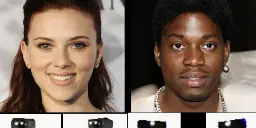Astronomers discover technique to spot AI fakes using galaxy-measurement tools
Astronomers discover technique to spot AI fakes using galaxy-measurement tools

Astronomers discover technique to spot AI fakes using galaxy-measurement tools

Astronomers discover technique to spot AI fakes using galaxy-measurement tools

Astronomers discover technique to spot AI fakes using galaxy-measurement tools

If there’s an algorithm for detecting deep fakes, there’s an algorithm for creating an AI capable of fooling that algorithm.
And then someone will create a new AI capable of defeating the old one. It’s just AIs all the way.
And they’ll train that AI on the first AI’s detection performance. This process is called Generative Adversarial Neural Networks, or GANN. It works really well and allows AI to become superhuman by having superhuman obstacles to overcome.
"This image was generated anywhere between 3 and 3 million years ago by an AI"
Another arm in the arms race. The next gen of face generation will have this mastered.
Does it really work like that? I would say that they are not trying to fool any test, just getting harder to be detected. The goal being looking completely realistic.
Looking completely realistic and being able to discern between real and fake are competing goals. If you can discern the difference, then it does not look completely realistic.
I think what they're alluding to is generative adversarial networks https://en.m.wikipedia.org/wiki/Generative_adversarial_network where creating a better discriminator that can detect a good image from bad is how you get a better image.
This is one of the basic techniques to spot AI fakes:
The "test" they're trying to fool, is kind of the Turing test: whether humans can tell them apart.
this should work on its face because many machine learning algorithms optimize for low Gini coefficient, e.g. a decision tree classifier makes binary splits based off the greatest reduction in Gini; astronomers use something similar to compress the data sent back from space telescope cameras to a reasonable filesize, so if a picture of a face has weird Gini coefficients then it makes sense that it would've been AI generated
To quote the article.
While the eye-reflection technique offers a potential path for detecting AI-generated images, the method might not work if AI models evolve to incorporate physically accurate eye reflections, perhaps applied as a subsequent step after image generation.
I'm not discouraging AI detection, we will absolutely need it in the future, but we have to acknowledge that AI detection is a cat and mouse game.
oh absolutely, it's specifically a generative adversarial network!
using galaxy-measurement tools
What if they use an iPhone?
🤖 I'm a bot that provides automatic summaries for articles: ::: spoiler Click here to see the summary Researchers at the University of Hull recently unveiled a novel method for detecting AI-generated deepfake images by analyzing reflections in human eyes.
Adejumoke Owolabi, an MSc student at the University of Hull, headed the research under the guidance of Dr. Kevin Pimbblet, professor of astrophysics.
In some ways, the astronomy angle isn't always necessary for this kind of deepfake detection because a quick glance at a pair of eyes in a photo can reveal reflection inconsistencies, which is something artists who paint portraits have to keep in mind.
They used the Gini coefficient, typically employed to measure light distribution in galaxy images, to assess the uniformity of reflections across eye pixels.
The approach also risks producing false positives, as even authentic photos can sometimes exhibit inconsistent eye reflections due to varied lighting conditions or post-processing techniques.
But analyzing eye reflections may still be a useful tool in a larger deepfake detection toolset that also considers other factors such as hair texture, anatomy, skin details, and background consistency.
Saved 70% of original text. :::


Is there anything astronomers can't find out from a couple of pixels?
They're still trying to find a computer capable of measuring the mass of your mom
Uncalled for but 10/10 execution
That's like, their whole life, it sounds like.
Geologists stare at rock formations, astronomers stare at fuzzy pixels. In both cases they study crazy things from deep time, but in a way that would slowly drive me mad.
You can tell a lot from how a CMOS or CCD picks up a couple photons